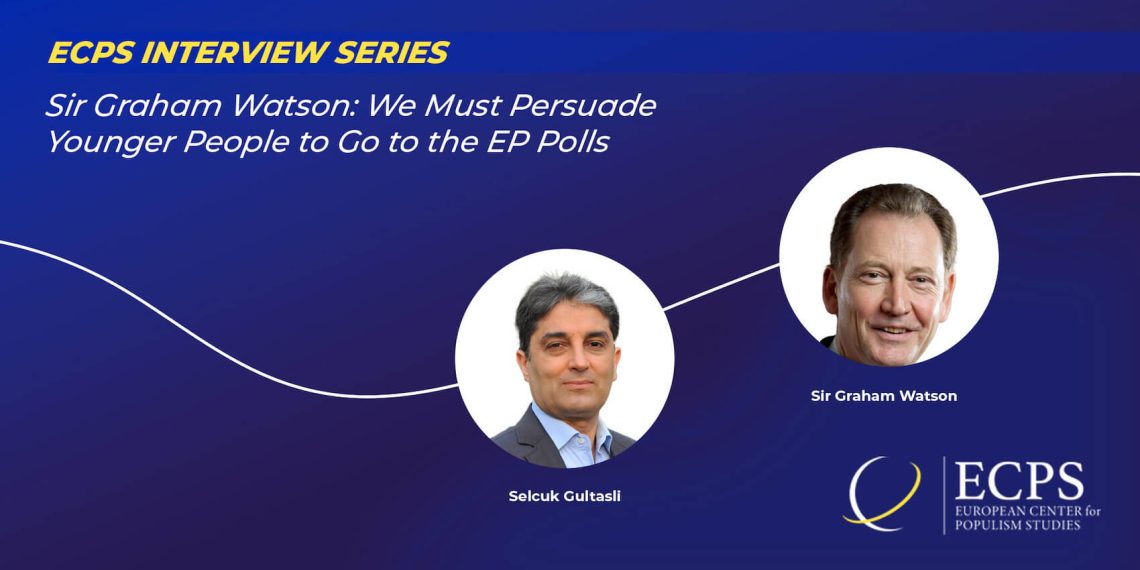As opinion polls indicate a potential surge in support for far-right parties in the European Parliament elections scheduled for June 6-9, Sir Graham Watson emphasizes the critical need to persuade younger people to vote. “In recent years, we have seen significant abstention among younger voters. This was a major factor in Brexit,” Watson explains. “We desperately need everyone eligible to vote, especially those over 18 across the European Union, to exercise their democratic rights. Perhaps the younger generation does not fully grasp that freedom must be actively used, or it can be lost. If they do not use their freedom to vote and participate in democratic society, they risk losing that freedom in the future,” he warns.
Interview by Selcuk Gultasli
In an exclusive interview with the European Center for Populism Studies (ECPS), Sir Graham Watson, a liberal politician and Advisory Board member of ECPS, emphasizes the urgent need for mainstream parties to intensify their efforts in the upcoming European Parliament elections. "It is particularly important to persuade younger people to go to the polls," Sir Watson asserts, highlighting a critical factor that influenced the Brexit vote. "In recent years, we have seen significant abstention among younger voters. This was a major factor in Brexit, where older voters, who largely supported leaving the EU, turned out in high numbers, while younger people, who favored remaining, did not vote in large numbers."
As opinion polls indicate a potential surge in support for far-right parties in the elections scheduled for June 6-9, Sir Watson shares his concerns about the implications for the European Union’s future. He acknowledges the far-right’s growing presence in countries like Germany and Italy, where parties such as Fratelli d’Italia and Lega Nord are gaining traction. "Clearly, the next Parliament will include a larger far-right group," Sir Watson notes. However, he believes that mainstream democratic forces will still hold a majority, provided they collaborate effectively to counteract the far-right’s influence.
Sir Watson, a former leader of the Liberal Group in the European Parliament, also addresses the broader threat posed by the far-right and populist radical right parties, arguing that their potential success does not signal the end of liberal democracy but represents a significant danger. "A lot of people think ‘Oh, well, it’s only the European Parliament. It’s not national parliaments.’ They underestimate the European Parliament’s role in shaping public policy in every Member State," he explains. Watson warns that the presence of nationalistic and anti-democratic forces could lead to the fragmentation of the EU and a rollback of social progress.
Highlighting the external threats to the EU, Watson points to Russia’s aggression in Ukraine and its financial support for far-right politicians like Salvini in Italy and Marine Le Pen in France. "The Russians are trying to destabilize the European Union to reestablish their hegemony on the continent," he warns. Sir Watson underscores the necessity for EU member states to recognize and respond to this threat.
Addressing strategies to boost voter mobilization, particularly among the youth, Sir Watson stresses the importance of leveraging technology and social media algorithms to counter the far-right’s influence. "We need to use this technology ourselves to get our message across," he says, emphasizing that mainstream parties must defend the principles of liberal tolerance and democracy more effectively.
As Sir Watson prepares to stand in Italy for the European Parliament elections, his commitment to combating the rise of the far-right and promoting European unity is clear. "We must persuade younger people to go to the polls," he reiterates, underscoring the critical role of voter participation in safeguarding the future of the European Union.


